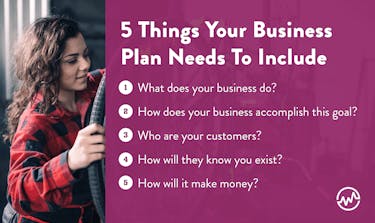

Get Access to 250+ Online Classes
Learn directly from the world’s top investors & entrepreneurs.
Get Started NowIn This Article
Do you want to start your own business in your teenage years? With the right knowledge and tools, you can! Being a teen doesn’t disqualify you from getting a head start on your career path. Some even launch their life’s work before they’re old enough to get behind the wheel of a car.
This is the topic of the course WealthFit Entrepreneurship for Teens: How To Start Your First Business, taught by Nationally Recognized Teen Success Coach JP Servideo.

In this article, we will break down a few of Servideo’s tips on how to start your own business as a teenager, including:
- what it means to be an entrepreneur
- choosing a business idea
- creating a business plan
The Entrepreneurial Mindset: Teen Edition
Maybe your parents or your friend’s parents have their own businesses. This didn’t just happen overnight; it took hard work, sacrifice and dedication.
There’s a powerful reason people work hard to start their own companies. To explain why, we’re going to break down the “E-Myth” framework, developed by author and entrepreneur Michael E. Gerber.
The E-Myth framework envisions a triangle of workplace positions.
The Base: Technicians
At the widest part of the triangle — the base — are technicians. These are the people who do the grunt work of the company. They are the bakers, the coders, the builders, and the salespeople who do the day-to-day work that the company provides to the client.
In order for these workers to make money, they have to wake up, arrive at work and clock in. If they don’t work, they don’t earn any money.
The technicians are a vital part of any business. If they don’t show up, the work is not completed and the business can’t run.
Middle: Managers
Managers form the mid-section of the triangle. When a business starts to grow, managers are hired to organize and manage the technicians.
They ensure everyone is doing their job and maximize profit by eliminating inefficiencies.
Top: Entrepreneurs

At the top of the triangle is the entrepreneur. Having hired managers to handle mid-level responsibilities, the entrepreneur makes the biggest decisions at the company.
A true entrepreneur has delegated the bulk of the necessary tasks onto others and serves as a decision maker and overseer.
Not only does being at the top of the triangle provide more money than the managers or technicians; it provides more freedom. Ideally, once the business is set up with management systems, the entrepreneur can step back and let the business run on its own.
That’s one of the top reasons that people start their own businesses: to be their own bosses.

This is the true essence of entrepreneurship: creating lucrative systems that can someday run independently with oversight and direction from the person at the top.
What Will Your Business Be?
So now you’re sold on becoming your boss. What’s the next step? Determining what your business will be.
When brainstorming potential business ideas, not even the sky is the limit. Just ask Elon Musk, the serial entrepreneur behind PayPal, Tesla, SpaceX, and SolarCity.
Musk chased his passions for technology, sustainable transportation, space travel, and renewable energy and turned them all into successful businesses. Now he gets to blast rockets into space as part of his daily job.
With the right business idea, passion, and team, anything can truly be a business.
So how do you choose which idea to pursue when thinking about business ideas for teens?
One thing successful entrepreneurs will say over and over is to do what you love. Though it might seem cliche, it’s likely you will work 110% harder for something that you’re passionate about than for something that doesn’t excite you.
What are you passionate about?
Passion is critical, because a universal truth about starting a business is that you always hit major hiccups on the road to success. When the going gets tough, an entrepreneur needs to sink their teeth in deeper and fight for their company’s survival. In Elon’s case, he personally funded several of his companies.
When creating a business, it’s advantageous to dive into an industry that you would be willing to give your blood, sweat, and tears to do well in.
Business Ideas for Teens
Do you already have a business idea in mind? If not, here are 12 potential business ideas for teens to choose from or use as inspiration as you think about your business idea.

The Business Plan

Once you have the desire to become a business owner and you have the idea, what’s next? Creating a business plan.
The business plan is more than just the idea behind your business. It’s an outline of your business, including research about your customers, your costs, and how you plan on growing.
There are five basic questions to answer when looking at business ideas for teens.
#1: What Does Your Business Do?
This is the first question anyone — from your mom to someone who may invest in your business — will ask you about your company.
What purpose does your company serve? Having confidence in your answer is the first step to bringing your idea to light.
For example, let’s use the first idea in the business ideas for teens list above — pet sitting.
Describing what your business does could be “we offer pet sitting services so that you don’t worry about leaving your pet at home.” It could go on to say “we will treat your pet as if it's one of our own.”
If you already have your business idea, take a minute to think about or write down what your business does before moving to the next step.
#2: How Does Your Business Accomplish This Goal?
Begin to identify what tools are needed to achieve success and your operation plan. Ask yourself questions like:
- What is the operation manual?
- What supplies do you need?
- Will you need to hire employees (such as your friends)?
- Where will your business operate?
Using the simple pet sitting example from the business ideas for teens list above, this could be:
- determining your hours of operation
- a 5-step process of what happens when a customer brings their pet to you (paperwork, payment, bath, walk, food, etc.)
- determining the location (for example, “my family has agreed to let me use our backyard for a few pet sitting services”)
- Hiring (“my brother will work a specified amount of hours”)
- Outlining needed supplies (“5 extra collars, 5 extra leashes, pet food, and bath materials”)
The more detailed you can get in answering these questions, the less likely you are to come across a situation that you haven’t thought of or aren’t prepared for.
Take a minute and write down your operation plan and the tools you will need to succeed.
#3: Who Are Your Customers?
In this section, determine who your target customers are. Instead of thinking of your customers as random people who will pay for your services or product, think about who is most likely to do business with you.
Many companies choose to conduct research about what kinds of people are most likely to buy their products. This can include product testing, surveys, or analyzing data about their ideal consumer and how to reach them.
For the pet sitting example in the business ideas for teens list above, instead of thinking as your customers simply “pet owners”, the more specific answer could be:
- pet owners in specific neighborhoods who are planning a vacation or a trip out of town
- pet owners who have to commute to their work every day and leave their pets at home alone
So who are your customers? Remember: be as specific as possible.
#4: How Will They Know You Exist?
Some of the best products and services failed because no one knew about them. How will your customers know that your business exists?
Now that you know your target customers, think of creative ways to market your product or services to them.
Remember that customers today are bombarded with advertisements all the time, so ensure that you and your business stand out from the crowd?
#5: How Will Your Business Make Money?
In this step, it’s time to outline how you will keep sales higher than expenses in order to keep your company in business.
Answer questions like:
- How much will your services or product cost?
- How much will your expenses cost?
- How much will you spend on marketing your business?
- In a month, how much money do you think you’ll have made?
Structuring Your Business
Now that you have your business idea and your business plan, it’s time to talk about how to structure your business so that it’s safe and legal.
Create A Separate Entity
Each business carries with it a certain amount of liability or risk. In order to minimize the impacts of something going wrong, like one of your employees getting injured at work or a product malfunctioning, businesses are separated into entities.
An entity is a way of structuring your business to keep it legally and financially apart from your personal life and other businesses. Think of it like a protective bubble.
Should one of your companies get sued, filing it as a separate entity means your personal money or the money you’ve generated from other sources won’t be able to be taken in a lawsuit.
Paying Taxes
Incorporating as an entity is also useful for tax purposes. Every person and every business has to pay taxes, which pays for government needs (read more about taxes and how to file them by clicking here).
In order to encourage businesses to grow and stimulate the economy, the government allows tax “write-offs” or discounts for businesses. This means that if you use your cellphone for your business, you might be able to write off a portion of your phone bill on your taxes and pay less taxes.
If you want to learn more about how to save money on taxes, click here.
Be sure to consult a licensed CPA or attorney before deciding what kinds of write offs and what type of entity is appropriate for your business.
Meet These Successful Teens
Starting your own business is hard. But some teenagers have done it — and had tremendous success.
$60,000 For What Started As A Lemonade Stand
A 6th grader from Austin, Texas, Mikaila Ulmer had big plans for her favorite family recipe for honey lemonade. After starting with a lemonade stand, Ulmer began selling her lemonade to local stores.
It was a hit.
Ulmer ultimately ended up on Shark Tank, where investors decided to fund her business for $60,000.
Now, “Me & The Bees” lemonade can be found at Whole Foods stores across the country and Mikaila gets to spend time managing the business with her family, all the while supporting bee-saving charities.
Locket Necklaces Make Millions of Dollars
At age 14, Bella Weems began saving up for her dream car. Her parents encouraged her to start a business to fund her efforts, so, with $350 in her pocket, Weems started selling locket necklaces to friends and family.
Her necklaces with little charms on the inside charmed the world.
Weems grew her company into “Origami Owl”, which now sells lockets and bracelets through over 60,000 independent sales consultants and has revenues in the triple-digit millions.
With a big idea and a heavy dose of grit and hard work, anyone can start a successful company, no matter their age.
Time To Launch
If you have your idea and your business plan, it’s time to launch your business!
The best way to prepare yourself for starting your own venture is to
- educate yourself
- get support
Educate Yourself
Every business mistake that is possible has been made before. If you want to learn more about starting a business, read business books to learn from others’ experiences and increase your knowledge about the industry you’re entering.
Also, continue your education by watching JP Servideo’s Entrepreneurship for Teens: How To Start Your First Business course.
This course will give you expert level guidance from successful entrepreneurs. You’ll learn step-by-step . . .
- How use the entrepreneurial mindset to turn your favorite activity into a thriving business
- How to write the perfect business plan — one that helps you focus — but also lets you adapt
- How to choose between 3 different entity options to pay less taxes and protect against liability
. . . and more!
Get Support
Mentors and coaches are everything. Connect with entrepreneurs in your area who can show you the ropes and even help you get a leg up on your journey.
Or, you can schedule a call with Servideo after watching his course and ask his advice.
One of the best parts of entrepreneurship is that you never stop learning. You may experience some setbacks, but don’t be afraid to fail fast and move forward with the next opportunity.






